TESTIMONIALS
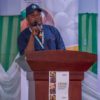
“The findings from PIND’s study revealed some systemic constraints in the cocoa value chain. These include low productivity of farms arising from poor agricultural practices; predominance of older and ageing trees with low yields; absence of high-yielding seed varieties; inferior quality beans arising from poor post-harvest practices – leading to discount prices of Nigerian cocoa in the global market; and a lack of coordination among actors and functions within the value chain.”
read more

“Thank God another door has opened to me…before now, I was just engaged in tailoring…being a tailor is good but when I came to know about solar and started doing this installation, more funds are coming…. I now pay more bills which I couldn’t afford before, put more food on the table which I also couldn’t do before…it has helped a lot, and it has doubled the standard of my living.”
read more
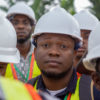
“The training was really cool and worth it… I started a delivery business…like doing home delivery jobs where I pick up your phone from your provided location, make sure it’s fixed and deliver it to you immediately and I get my cash. The least I get is 4,000 Naira weekly and if not for some little spending, I believe it should be more than that… because I do buy stuff. I make money I can use in doing most of the things I need to get done…and I noticed that I don’t ask much from my Dad anymore.”
read more
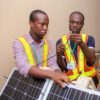
“I learnt Computer-Aided Design (CAD) so where I am working right now, I am a Chief Product Designer there. I am using my capabilities and CAD skills to do product design as a trade in the modelling of any product and I am paid. I am grateful and thankful to NDYEP and CIC for providing such an opportunity for me because now, I have started applying for all these online universities to try and go to school… with the skill I have, I am earning well.”
read more

“Before now, after I finished my ordinary national diploma (OND), I was sourcing for funds to complete my higher national diploma (HND)… and I was earning 7,000 Naira a month. After I started working with CIC with skills from the NDYEP training, I can probably say that I am a millionaire now because the project with GIZ was worth 2.7million Naira, excluding my salary at CIC.”
read more

“I was very happy during the solar installation and maintenance training because I didn’t have any skills or handwork, the only thing I had was my certificate. I am just into solar installation for now. The average earning depends on the KVA you are installing… it varies… and you still have to consider the people that will help you out during the installation, so on an average maybe you get 30, 000 0r 50, 000 Naira depending on the KVA and what amount you have charged the customer. Now, I am making an income and I am very happy.”
read more
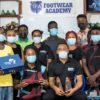
‘’My name is Precious Ogbonna-Ben; I am from Abia State, a graduate of economics. I enrolled to learn leatherwork through the NDYEP training under the Footwear Academy. I got to learn a lot. I can make footwear for myself and for people, such as slippers and sandals. Before, I used to be at home, sitting doing nothing. Now, I can wake up in the morning, come to the Footwear Academy, and work because I have a lot of orders that I need to deliver.’’
read more

‘’My name is Blessing Samuel. I live in Rivers State. I got to know about the NDYEP training project through a friend who happened to be a member of the Rivers State Youth Empowerment ministry. Before I joined the PIND training program, I had no idea whatsoever with anything that has to do with aquaculture. In short, I felt when you talk about fisheries or talk about poultry. It had to do with farmers who are from the rural villages. The PIND empowerment training program has changed a lot of things for me.
I didn’t have a job from the onset, and it was difficult to get one (1) because I’m not a graduate, so there’s no certificate attached to me. But after the program, I could manage a farm; I could make a living out of it. So, a lot has changed. It has also changed my perspective; I didn’t have to go out there and start looking for a job. I could, actually, do something with the experience I’ve gotten from the PIND training; I can now rear fishes. I have an experience to start a fish farm, so I don’t have to depend on anybody to look for a job. I can create a job for myself and, also, for other people. So, that’s a huge change and a huge experience.
Presently I’m managing a farm, and that’s one (1) of my short-term goals. Managing a farm is giving me a vast experience. I get to manage the fishes. I get to manage the poultry that has to do with the birds, the layer birds in particular. I get to manage snails, and it has broadened my experience. Now, I am into farming fully. I want to say a big thank you to PIND and Aqua Green, who have implemented this program. I’m now looking at it that there is a brighter future.’’
read more
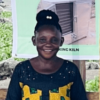
I own a fish farm and belong to Alero Fish Farmers Cooperative Union, a fishing cluster in Egboko Itsekiri, Warri South LGA, Delta State. PIND’s aquaculture service providers usually come around to train us on best management practices. Also, if we have any issues with our fish farm, we would reach out to them, and they would come to check on our progress. We are well-trained in this business. We also received training from USAID, which PIND also facilitated. There, I learned how to process fish and degut and skewer the fish for drying. I have also stepped down this training to other farmers within my cluster. They come to my farm, and they help in processing the fish. In 2020/21, PIND also introduced us to Sterling Bank and selected some of us to receive loans. I was one of the loan beneficiaries and refunded it within one year. I was on my farm one day and received a call from PIND.
They told me they wanted to give me another benefit in commemoration of International Women’s Day: a biodigester and a smoking kiln. They brought the equipment to my farm and oversaw the entire installation. I no longer use drums for smoking fish. One of the issues I had with using the drum and firewood grill was the smoke. As the oil from the fish drops into the fire, the flames will go up, so I always had to stay close to monitor the grill. The smoke from the fire also harmed my eyes, and I often had to step away from the grill to catch my breath. The smoking kiln has a regulator.
I can conveniently adjust the heat. I can also dry more fish at once with the kiln than with the drum. I could not dry more than 20 kilograms of fish with the drum, but I could dry as much as 100 kilograms in the kiln. There’s enough space for the fish, and I do not have to wait for one batch to dry before I start a fresh set. I no longer have to reject some processing jobs because of a lack of space. The kiln also has a door that I can shut to lock in the heat. Once the door is closed, I focus on the regulator. If it is too high, I adjust it. It is not like an open fire; you can leave it unattended. I handle all my business – farming, selling, and processing – on my farm. I even expanded by adding a provision store. Customers can buy drinks from the store and relax while they wait for their fish. PIND has really helped me. I appreciate them.
read more
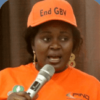
As the founder of the Girls to Women Research and Development Centre, I have benefited from PIND’s capacity-building interventions targeted at civil society organizations in the Niger Delta. I participated in several PIND training, first as a beneficiary and later as a consultant on gender issues. PIND helps strengthen CSOs and improves their capacity and visibility to attract funding. With the support and mentoring I received from PIND, my organization could access grants from the government, the private sector, donors, and partners. PIND was helpful in terms of funding and providing capacity enhancement at various levels.
The training also helped me navigate my current role as the Gender Advisor to the Ondo State government. I can implement my activities because I have clear-cut ideas, skills, capacity, etc., to do my work well. PIND has been part of my success story, getting me to where I am now. All the skills I have learned have made it easy for me to work well within the government. I advise anyone looking to work within government first to garner CSO experience and knowledge of the development sector and programming
read more
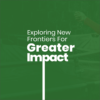
After I graduated from the University of Akwa Ibom in 2017, I worked for myself, producing and training people on how to make perfumes and soaps. I was hawking some products on the street when I saw an advert for the Youth Employment Pathways (YEP) training. I decided to apply to be trained in plumbing and piping. I studied Mechanical Engineering, which is a similar field. At the time, most of my knowledge was theoretical and not practical, making it difficult to get a job in my field of study.
Through the YEP training, I gained practical plumbing and piping knowledge and secured jobs immediately. The soft skills training taught me to market myself appropriately to customers and get adequately paid for projects. I am more safety conscious on site to avoid hazards while working. My bookkeeping skills and client relationship have also improved. I can also deliver training to other people in construction. I recommend the YEP project to others because it changed my life.

I stumbled on PIND’s Youth Employment Pathways (YEP) project through a Facebook-sponsored ad in 2019. I was studying Public Administration at Abia State University and looking for an organization for my one-year industrial attachment. I was also hoping to raise money to complete my studies. I applied for YEP and was selected. I trained in Computed Aided Design at Clintonel Innovation Hub. Without a background in the STEM field, I initially struggled.
However, the training was enlightening, and I soon adapted to the world of digital technology. I also received soft skills training in communication, team building, and conflict management. After the program, Clintonel Innovation Hub offered me full-time employment. With my income, I finally finished school. In 2021, a few of my colleagues and I formed a consortium and applied for the YEP Challenge Fund.
We received a one million naira grant, which I used to start my company, Solaris GreenTech Hub. It is a start-up based in Aba, Abia State, that designs solar booths and installs them in communities that do not have access to electricity due to being off the national grid.
Our booths are close to schools and other crowded places where people can easily access them. Each one currently provides power solutions to over 400 students, 400 direct customers, and 1,500 indirect beneficiaries (usually other household members who benefit from the electricity). Besides the solar booths, we also sell and install micropower chips. Our services are available in Abia, Enugu, and Ebonyi States. But we plan to extend our solar booth technology to other states and, eventually, other parts of the world. The solar booth innovation has garnered interest from organizations like the West for Africa Foundation, Westerwell Foundation, Nigerian Climate Innovation Center, and All On, an energy investment company in Nigeria.
In 2021, we received $20,000 in equity investment from Hardware Garage. In 2022, we won the All On and NTIT Energy Challenge Fund and received a $10,000 grant to scale up our work. We also received the MicroGrid Young Talent of the Year Award hosted by RES4Africa Foundation in collaboration with Enel Green Power and the European Investment Bank (EIB), including a prize of €5,000. Finally, we won the two million naira Wimbiz Investment Grant 2022. In total, Solaris has raised about NGN 10 million in grants. Through RES4Africa Foundation’s sponsorship, we attended the 27th United Nations Climate Change Conference (COP 27) in Egypt. We participated in Westerwell Foundation’s six months acceleration program. And we are one of the ten founders attending the Berlin Conference in Germany in May 2023. Everything we have built and achieved in my company is thanks to the initial grant from PIND’s Challenge Fund, which allowed us to roll out the prototype of our solar booths. PIND believed in my dream and changed my life.
read more
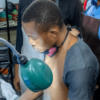
I used to operate a POS business at RIVTAF, Golf Estate, Port Harcourt, and I wanted to upgrade and own a fully-stocked supermarket. I approached PIND and took part in the Business Linkage Program. I connected with business service providers (BSPs) who advised me on how to set up a supermarket, including staff recruitment. Through the BSPs, I met vendors who supplied me with various items. I also met a BSP, who provided all the CCTV purchase/installations and the systems hardware installation.
They delivered and installed the accounting software for the supermarket sales/inventory management activity. They helped manage all these processes, which resulted in an increased client base and business stability. I am now comfortably running my business with minimal support. We serve the Golf Estate residents in Port Harcourt and its environs and offer home delivery service. My income has increased by over 65% and continues to grow.
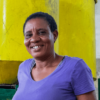
After years as a primary school teacher, I resigned and became a full-home farmer. During the COVID-19 pandemic, I met with Ambassador Godwin Akandu from Rivers State, a service provider, who introduced me to PIND, and I received training on cultivating oil palm. I then started planning oil palm and other plants like okra, cassava, and groundnut. However, I needed more capital to set up a palm oil mill. PIND brought business consultants who trained us to manage our businesses and funds. I and some others in my community became beneficiaries of a CBN loan. We set up a palm oil mill in Ahoda West as a group, all thanks to PIND.
I am well-known in my community for farming. I am also a nursery operator. When people buy seeds from me, they contract me to help set up their farms. PIND’s training equipped me with the skills to become a farm manager and get paid for it. I have been doing so well that I manage farms in Rivers and Bayelsa States. PIND also trained me in peacebuilding and conflict management. When I consult in a community, I find out what structures are in place to manage conflicts to ensure that the farms I work on are safe and free from there. I am also very passionate about women’s empowerment and inclusion. On my farms, I endeavor to employ women and pay them a daily wage.

Before I met PIND, one of the significant challenges I faced was germinating the oil palm seeds. I usually get an output of 30% instead of 80% of the hybrid seeds I planted. In 2019, I met with PIND and learned how to get improved seedlings. PIND helped me get technicians who assisted with the heating process and connected me to customers. I have a better relationship with nursery operators across different states, including Akwa Ibom and Abia, and have increased my production and the number of seeds I sell. Thanks to PIND, I buy seeds from Presco, an agro-industrial company, at a discount. I have also provided jobs for more people in my community.
PIND put me on the map alongside other prominent players in the sector. PIND’s workshops have provided excellent resources for moving the oil palm sector forward. I appreciate PIND for all they do for farmers and nursery operators in the oil palm sector. Unlike my father, an agronomist, I am an engineer, so I had much to learn about the business I inherited from him. However, my partnership with PIND has helped make this transition smoother